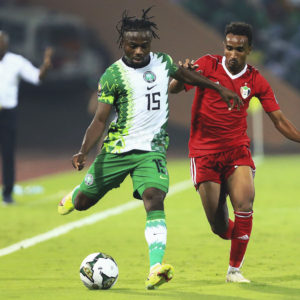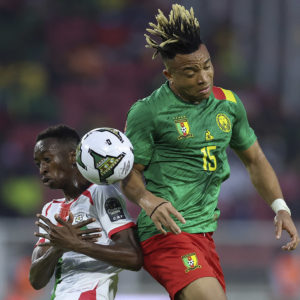A love affair with football drives Vincent Aboubakar
The Cameroonian striker is one goal away from eclipsing the Afcon record of the great Samuel Eto’o. Those who have followed his career from the start explain how he arrived at the summit.
Author:
24 January 2022

“Football is something I’ve always loved,” says Vincent Aboubakar, 30, Cameroon captain and star of the 2021 Africa Cup of Nations (Afcon). This love affair, which began in Garoua, the capital of the North region where he was born, has taken Aboubakar all over the world playing for clubs in Africa, Europe and Asia.
His exploits have endeared him to many Cameroonians. Cenajes Stadium in the city of Garoua, which is used as a training venue during the Afcon, even has a mural of the Indomitable Lions’ striker.
“As a child I played football just for fun and then eventually I played the Top Cup, where I was voted best player,” says Aboubakar. “From there I went on to play at the Brasseries Academy [which has satellites across the country] and in the club. My coaches told me I could do something great in the sport.
“From Brasseries, I got scouted then went to Coton Sport’s youth setup before playing with the first team. After I went to the World Cup in 2010, I signed for Valenciennes in France then Lorient, and later on to Porto.”
Related article:
His talent was evident from a young age. “When I first saw him play, I was very surprised by his ease on the ball and his ability to take on three or four players with wonderful dribbles,” says Christophe Ousmanou, who at the time headed the football academy of Cameroon giants Coton Sport de Garoua and these days coaches Cameroon’s Under-20 team.
“I could tell that this boy was different from others. He was such a calm player and anyone who observed him for long knew that even before he received the ball, Vincent knew what he was going to do with it.”
Ousmanou was shocked that no other club had approached the lanky yet technically gifted Aboubakar, who had already established a standing as one of the bright prospects in the city of Garoua.
“I called Coton Sport’s president, Maina Gilbert, and told him that I had seen a very talented youngster who had the potential of becoming a very good player. President Maina accepted and we brought in Vincent alongside Edgar Salli, while Jacques Zoua was already in the academy.” The trio was part of Cameroon’s 2017 Afcon-winning squad.
Related article:
Aboubakar’s brother Michel Dior, whose footballing aspirations were cut short by an unhealthy lifestyle, says his younger sibling was very focused even as a child. “He had almost the same itinerary every day. He went to school then came back home and headed to the pitch. Every day was almost the same routine for him.
“He wasn’t like us. He never indulged in some of the shady things we did as young boys. [The neighbourhood] Roumdé Adjia is often remembered for producing criminals and drug consumers, but he never did any of those things. He knew what he wanted as a kid and he worked hard towards it.
“He was a very good attacker but also a very good goalkeeper. I nicknamed him Ekongolo, after a very popular keeper who used to play for Étoile Filante of Garoua when we were kids. He was just so dynamic for a child.”
Fate and fortune
Aboubakar’s rise in Cameroonian football is a tale of good fortune and the overlapping scheduling of two major football tournaments, the Francophone Games and Fifa Under-20 World Cup, in 2009.
Having finished as runners-up in the 2009 African Youth Championship in the Rwandan capital of Kigali, Cameroon’s Under-20 team had secured direct qualification for the World Youth Cup in Egypt from 24 September to 16 October. The sixth Francophone Games in Beirut, Lebanon, had been lined up from 27 September to 6 October. Cameroon decided to have two teams: one that would go to Egypt and the other to Lebanon.
“Etienne Sockeng had been named head coach of the side that was to play at the Francophone Games and that’s how I suggested Vincent to him,” says Ousmanou. “He went there, trained and the entire staff was pleased with what he did, even if he, later on, didn’t travel with the side.
“Fortunately for him, a few months before, I had introduced him to Denis Lavagne, the head coach of Coton Sport, who tried Vincent and saw that he was good. So he was already a regular for Coton Sport when the opportunity presented itself.”
Related article:
Bankrolled by Cameroon’s cotton development company Sodecoton, Coton Sport had immense wealth. The club produced teenage sensations through its academy and Aboubakar looked very much like the next in a long line of exquisite football talent that they had churned out.
During the 2008-2009 season, in his first stint in Cameroon’s top-tier league aged just 17, Aboubakar showed flashes of brilliance. They were of a kind that left fans spellbound and made club officials believe that they had before them Cameroon’s budding goal-scoring sensation. The press waxed lyrical, likening him to the country’s emblematic goal-scoring machine, Samuel Eto’o, who is now the president of the Cameroonian Football Federation.
“At Coton Sport, everyone knew that he was a volcanic mountain waiting to erupt,” says Ousmano.
Aboubakar’s big breakthrough came when he helped the Cotton Farmers, as Coton Sport are affectionately known, win their 10th league title in 2010. His career then took off after the 2010 World Cup in South Africa. Cameroon’s head coach at the time, Paul Le Guen, named the teenage sensation as the only player from the domestic championship in his final list among a constellation of star players headlined by Eto’o.
“I knew deep within that I could get into that team for the World Cup and I worked hard and trained frequently just to be there,” says Aboubakar.
The tough times
Even before Cameroon headed to the World Cup, Abou-Chou, as Indomitable Lions fans now fondly refer to him, had already inked a three-year deal with French Ligue 1 side Valenciennes. He scored just 15 goals in 81 games when he linked up with the club after the World Cup. In Aboubakar’s own words, “these were the tough times”.
A move to Lorient revived his career. He scored 16 goals in 35 appearances to finish as the second-highest goal scorer in France that season. “In trials, you have to persevere, meditate and pray,” he says, adding that one just has to “stay focused and wait for the right time” to succeed.
But then came disappointment. Aboubakar was headed to Chelsea before a misunderstanding over commission percentages saw the deal scuppered. Then there were moves to Atlético Madrid and Borussia Dortmund that never came to fruition as well. “Growing up, I always wanted to play for Real Madrid, but in life you have to take everything with wisdom and good faith,” he says.
Related article:
Faith is an integral part of Aboubakar, having grown up in a Christian family in a predominantly Muslim city. His mother Maobeal Alice Aboubakar, who died on 25 December 2020, was a deaconess for the Evangelical Missionary Society of Cameroon.
“The most important thing for a person should be his spiritual elevation. The more spiritually elevated you are, the easier it is for you to comprehend certain things,” Aboubakar told journalists on a flight to South Africa in November 2021 to play in the World Cup qualifiers.
“I love reading, and for the past decade I’ve been reading a lot and studying a range of issues from metaphysics to astronomy, philosophy and a lot more. It’s important to read and understand these things because it brings clarity to a person and develops the virtues of a spirit.”
Aboubakar, who is the fifth of eight children, is writing a book on spirituality that he says may never be published. “I try to explore books that speak of the subconscious mind and how it can help you grow as a person. There are books which, when you read them, you’re more enlightened. One of my favorite books is The Power of Your Subconscious Mind by Joseph Murphy.”
A grounding force
His spirituality grounds Aboubakar, and it also helps him shine. “Five months before the Afcon in Gabon [in 2017] I spent some time at the home of former Cameroon international Aurélien Chedjou, and we had a very long discussion. I told him that we were going to win the tournament. That was in September. Then, during the tournament, I told [teammate] Clinton Njié that I was going to score in the final and you all saw what happened.”
Aboubakar’s ability to remain calm and unfazed even in the face of great uncertainty is a trait that Cameroon’s head coach, António Conceição, relishes. “Aboubakar is a very wonderful player, and on the pitch he shows all of these great qualities. He’s a good leader and the other players listen to him. That’s why he’s captain of this team,” says Conceição.
“For me, it is also an important decision having him as the captain. He speaks Portuguese, just like myself, and as such he can easily communicate to the players on the pitch my thoughts.”
Related article:
Beyond these considerations, Aboubakar is a constant upfront threat to the opposition. In his last 10 games donning the nation’s colours, he has scored an incredible eight goals, with five of these coming in three games at the 2021 Afcon. He is now three goals shy of sharing the third place on the list of Cameroon’s highest scorers of all time with Patrick Mboma.
With his five goals at the 2021 Afcon, he has also equalled Eto’o’s record of the most strikes by a Cameroonian player in one tournament. If Aboubakar scores against Comoros in the round of 16 in Olembe on 24 January, he’ll become the Cameroonian with the most goals in one Afcon. Comoros will have an infield player behind the goal line as their first-choice goalkeeper, Salim Ben Boina, is injured, while the other two keepers, Ali Ahamada and Moyadh Ousseni, are isolating after testing positive for Covid-19 along with 10 others.
“We can do great things and we know this,” he says. “That at the moment is what is most important and I will do what I have to, to ensure that we achieve our objective.”





